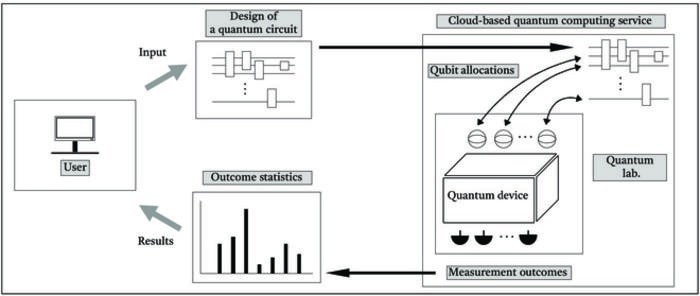Looking for a way for users of cloud-based quantum computing services to detect qubit entanglement, Jiheon Seong and Joonwoo Bae of the Korea Advanced Institute of Science and Technology came up with and tested an entanglement witness circuit.

The input to the service is a user-designed quantum circuit. The service begins with qubit allocation, which relates physical qubits to a designed circuit. An implementation of the circuit is run in the service, and measurement statistics are returned to the user as the outcome. Quantum advantages may be obtained when quantum circuits capable of generating entangled states are realized in the service. Image Credit: Jiheon Seong and Joonwoo Bae
It certifies involvement even when the cloud-based service enables limited control of the machine. Their study was reported in the journal Intelligent Computing, a Science Partner Journal, on September 21st, 2023.
Scientists aim to construct qubit circuits that create entanglement, but their entanglement-generating nature is uncertain until tested. To ascertain entanglement, they face the choice of conducting expensive quantum tomography or utilizing an entanglement witness.
This witness is a mathematical function linking two particular qubits and their states, and its output value indicates whether the qubits' states are entangled or separable.
However, it is not feasible to utilize an entanglement witness in the absence of direct access to the quantum machine. In a laboratory setting and the IBMQ cloud-based quantum computing service, a scientist could select which of the machine’s hardware qubits to house to a circuit.
In the IonQ cloud-based quantum computing service, users do not possess this degree of control, and as a result, cannot ensure the attainment of the necessary values to compute the output of the entanglement witness function accurately.
The only input of the researcher to the IBMQ and IonQ cloud services is a quantum circuit. For this limitation to be addressed, Seong and Bae developed unique entanglement witness circuits that make use of the entanglement witness strategy for certifying the existence of entangled qubits.
Scientists could utilize these circuits to detect entanglement just by using the measurement statistics output by the service.
They are not required to be able to regulate qubit allocation. Entanglement witness circuits allow scientists to utilize cloud-based computing to fulfill a so-called “essential requirement” in the process of looking for quantum advantages.
Furthermore, the new entanglement witness circuits are constructed on a recently developed framework known as EW 2.0, which is twice as effective at detecting entanglement.
Seong and Bae explain entanglement detection for two- and three-qubit entanglement-generating circuits, sketching two schemes for building entanglement witness circuits for entanglement-generating circuits and share outcomes of experiments with the help of the IBMQ and IonQ cloud-based quantum computing services.
Journal Reference
Seong, J & Bae, J (2023) Detecting Entanglement-Generating Circuits in Cloud-Based Quantum Computing. Intelligent Computing. doi.org/10.34133/icomputing.0051.